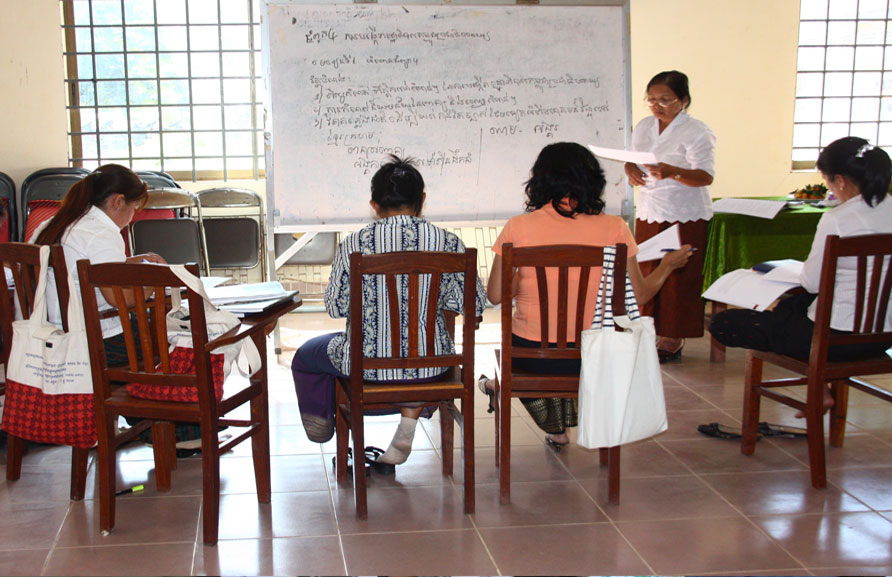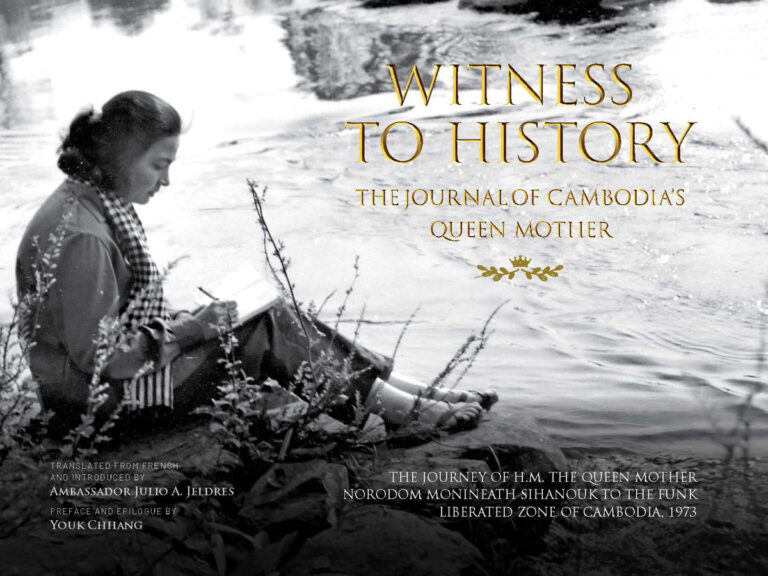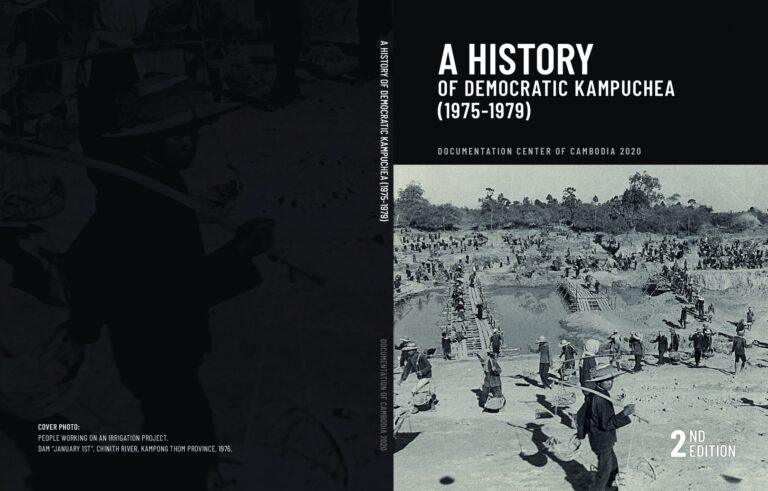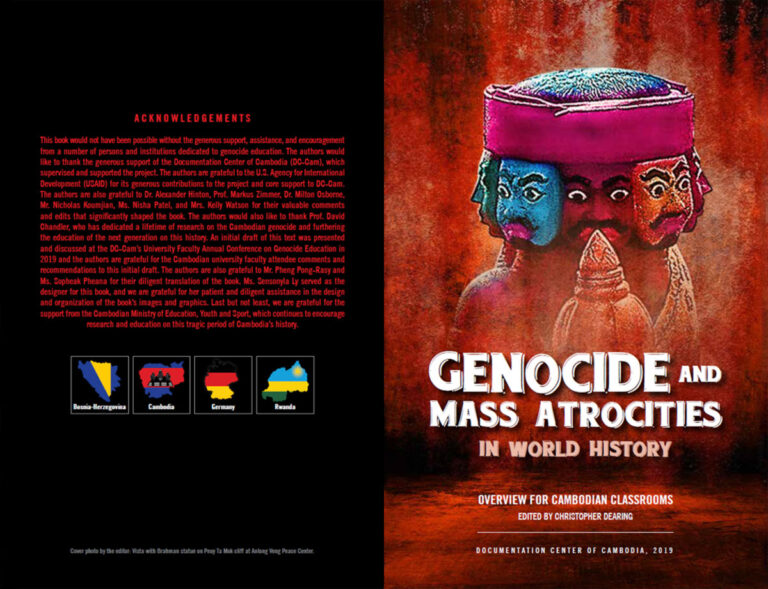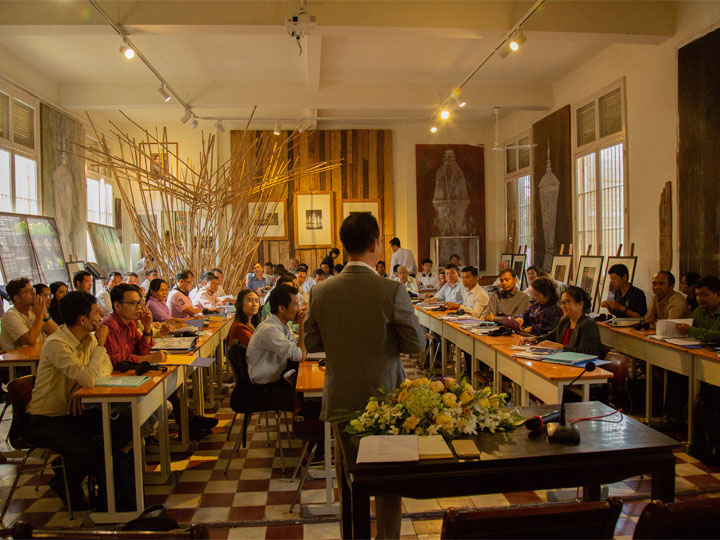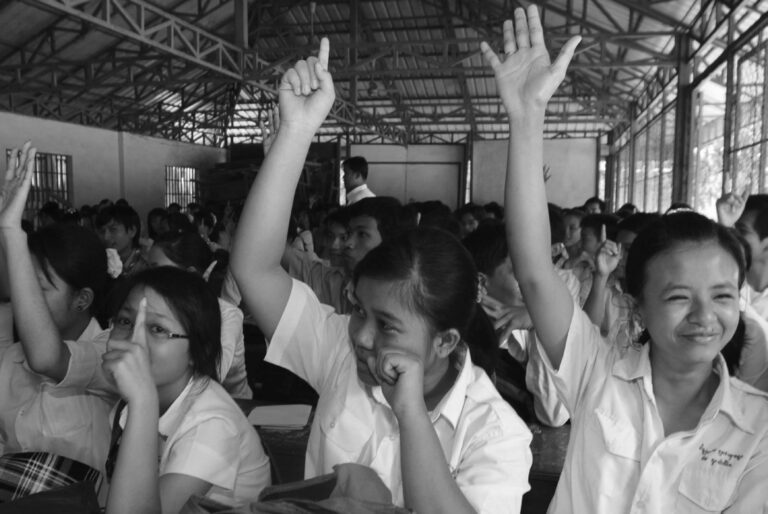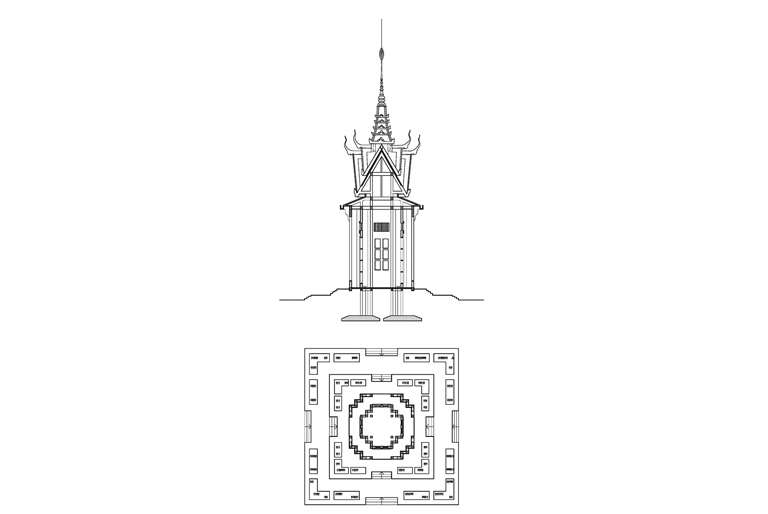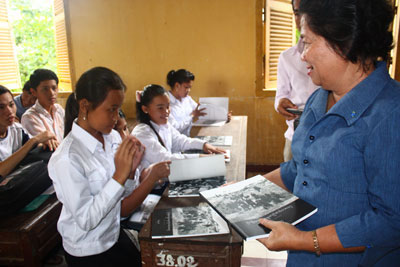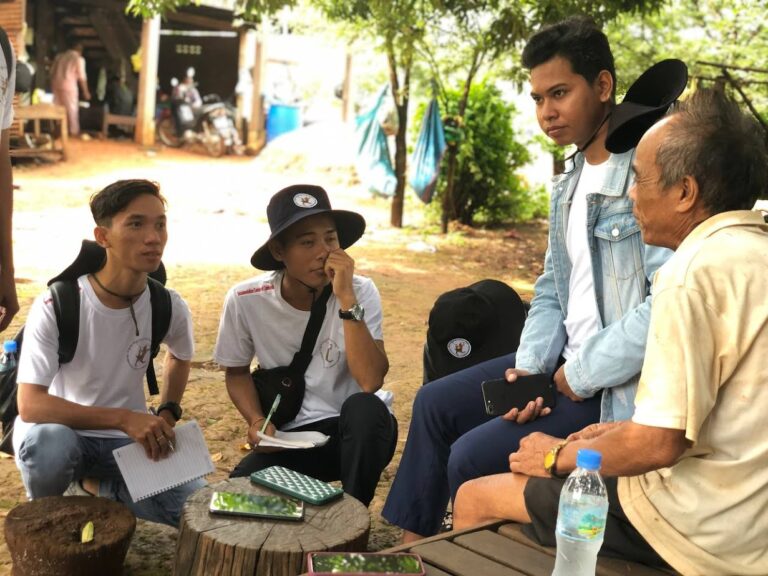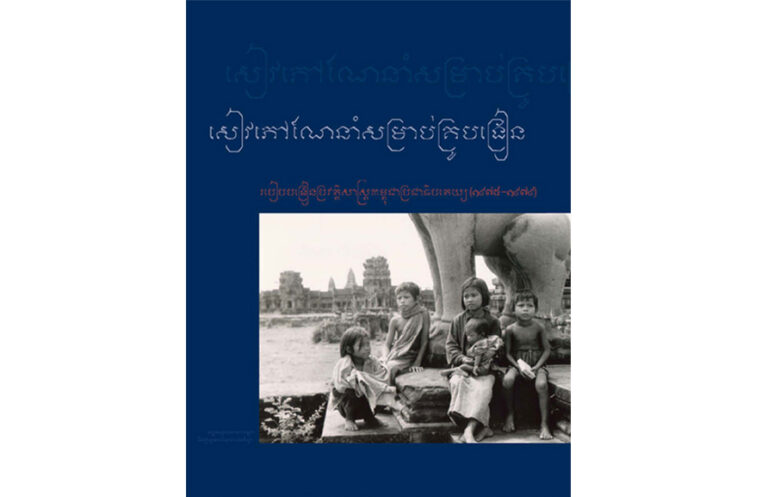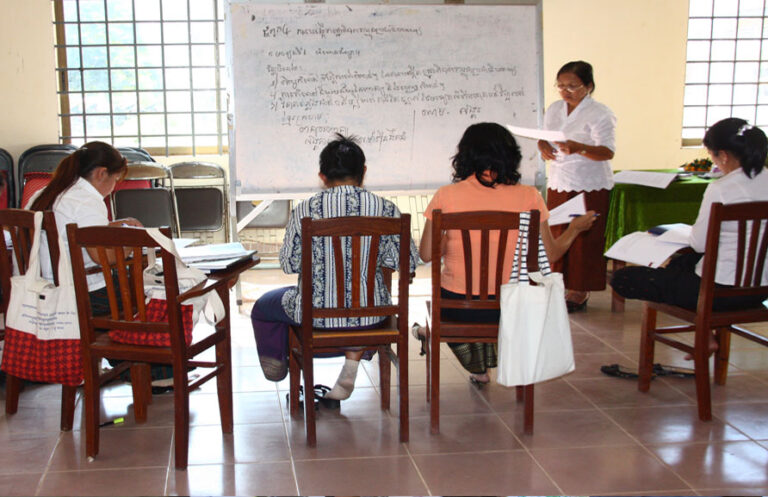Theory & Approach
The Documentation Center of Cambodia (DC-Cam)’s Democratic Kampuchea (Khmer Rouge) history education programme is grounded in local culture and it is participant (or student) centered. Using the history of Democratic Kampuchea as a starting point, the DK history education programme challenges participants with a wide variety of learning and cultural exchange activities that promote dialogue, a diversity of cultural expressions, and process-oriented learning outcomes. DC-Cam frames its historical content within the stories of people, both in written and oral narrative. Civil Parties, as well as local leaders, villagers, and elders are encouraged to share their understanding of DK history. Moreover the DC-Cam history textbook, teacher’s guidebook, and other materials provide a portfolio of stories that cover the spectrum of humanity and inhumanity. Participants are exposed to a wide range of narratives covering perpetrator, victim, bystander, and ‘upstander’ experiences.
In sharing and discussing these experiences, participants are able to consider alternative viewpoints, historical understandings, and cultural perspectives of DK history. In addition, with a nod to Howard Gardner’s Multiple Intelligences Theory, participants are given the opportunity to express their opinions and knowledge using a variety of different modalities, which encourage a diversity of cultural expressions. The DK history education programme offers activities spanning the entire spectrum of culture in Cambodia: from writing/interpreting a song, poem, or story, to painting a picture, assembling a collage, or participating in and interpreting a theatrical performance. Altogether these modalities not only ensure that the spectrum of learners is accommodated but a diversity of cultural expressions is promoted. With DC-Cam’s Teacher’s Guidebook, the teaching guide for teachers, the student-centered approach will be integrated into the classroom teaching. With this new student-centered approach, students will be able to develop self-learning, critical thinking, independent inquiry, high-order thinking skills, critical reading strategies, self-reflection, and problem solving skills among many other process-oriented outcomes that are necessary for the intellectual development of the students.
DC-Cam views teacher trainings as the vehicle for providing a direct benefit to the professional development of teachers, enhanced learning environment for students, and a mechanism for stimulating inquiry, dialogue, and reflection amongst community members on what happened and why during the Democratic Kampuchea regime.
The teacher trainings meet these objectives by blending local and foreign educational models and utilizing both large and small-group settings. In large groups, teachers are exposed to intensive lectures on the history of Democratic Kampuchea and the general practice points for teaching the history. In this sense, the teachers are taught using local methods that center on teacher-centered learning.
In addition, teachers learn how to manage large classes using student-centered learning approaches. The instruction pulls from theories in both andragogy and pedagogy. In large group settings (20-100 teachers), teachers observe the faculty trainers explaining the history and different methods for teaching the history, then faculty trainers model these lessons (using the teachers as pseudo-student/participants) while giving practice points throughout the mock lesson. After the model lesson, the teachers are given an opportunity to ask questions about any confusing areas of the historical content or the lesson methods. Large group lessons are generally conducted each morning of the training.
In the afternoon of each day, teachers are then required to practice the same or a similar lesson (with the help of the Teacher’s Guidebook as a reference) amongst smaller groups of their peers (between 5-20) who will conduct a peer evaluation for each practice lesson. In this sense, the training requires each teacher to not only study and become an expert in DK history but also assimilate new methods of teaching, which emphasize student participation and interaction and greater opportunity for critical thinking, inquiry, and debate. The large group settings allow the teachers to express themselves in a classroom setting that they are familiar with (large classroom lectures), and the smaller group settings challenge the teachers to practice their lessons before their peers. The smaller group setting is important because it allows the teachers to interact and learn from each other. Peers will be asked by the faculty trainer to evaluate and comment on each teacher’s performance.
While the aim is to have groups of the smallest number possible for the small group breakout sessions, at times the faculty trainers may have ‘small’ groups that exceed 15-20 teachers at one time. In these situations, the smaller classroom settings are still beneficial because teachers are able to interact with each other and every teacher is required to practice a lesson before their peers. Within each group of teachers, a faculty advisor will provide assistance on the delivery of the lesson and fill in any critical content knowledge gaps. However, it is important to mention that during the smaller group sessions, participants are charged with driving the educational experience. Faculty trainers are directed to facilitate the peer evaluations by providing their observations and input; however, the emphasis is on challenging the teachers to self and peer-evaluate. This exercise serves the dual purpose of allowing teachers to improve their lessons while also their understanding of their role as professionals. In effect, they experience what it is like to take charge of one’s own learning, which facilitates their appreciation for student-centered learning methods. Finally, it is important to mention that throughout the training, the teachers are instructed in a variety of different methods. Small group discussions, team exercises, pair-share, ‘socratic questioning’, jigsaw, and K-W-L exercises are just a few of the types of methods that teachers are taught, modeled, and ultimately asked to perform before their peers.
Reports by: Pheng Pong-Rasy
Pre-Service Teacher’s Workshop On “Integrating the History of Democratic Kampuchea (1975-1979) in the Classroom”
I. Introduction
The workshop “Integrating the History of Democratic Kampuchea (1975-1979)” was conducted by the collaboration between DC-Cam and the Ministry of Education Youth and Sport (MoEYS) with the generous support of the United State Agency for International Development (USAID). This is the second workshop conducted with pre-service teachers who are not majoring in history. Approximately 30 second-year pre-service teachers located in Prey Veng RTTC (17 female) participated in the workshop. This workshop focused on integrating a History of Democratic Kampuchea (1975-1979) into teaching subjects other than history. The workshop was held from March 10-12, 2020 at DC-Cam’s Prey Veng Documentation Center. The Center is located in Prey Veng Regional Teacher Training.
The main objectives of the workshop are:
- To equip pre-service teachers’ majoring in English-Khmer, Math-Physics, History-Geography, Citizenship-Morality, and ICT-English with Democratic Kampuchea history
- To enhance pre-service teachers’ access and capability in using Democratic Kampuchea period witnesses as speakers in the classroom
- To enhance pre-service teachers’ integration of Democratic Kampuchea history in their classroom
To ensure the quality of the workshop and its impact, DC-Cam invited two national trainers, and a civil party to share their experiences with the participants. The DC-Cam team also conducted the Pre- and Post-assessment at the beginning and the end of workshop, as well as interviews with participants to measure the knowledge they gained from the three day-long workshops.
The workshop used various methods of instruction including presentation, group discussions, survivors’ stories analysis, reflection writing, civil party sessions, and documentary films screenings (The First Witness).
After completing the workshop, the expected outcome is that participants will be able to:
- provide a detailed account of the history of Democratic Kampuchea (more questions were asked to make sure that their knowledge of Khmer Rouge history was clearly understood);
- demonstrate some modern teaching techniques, (ex. K-W-L, jigsaw, 3-Big Questions, Combination of K-W-L with jigsaw methods);
- Analyze and reflect on experiences of former Khmer Rouge’s survivors;
- conduct interviews using three part interviewing techniques to make more informative interviews;
- discuss how to integrate guest-speakers into their curriculum, and
- critically think about the impact, challenges, and solutions for integrating the guest-speakers and the history of Democratic Kampuchea into the classroom.
II. Outcomes
The workshop focused on disseminating the history of Democratic Kampuchea and demonstrating methods of integrating Democratic Kampuchea history in other school subjects. We were able to make the following observations in regard to the impact the workshop had on the pre-service teacher:
- There were moderate increases of 3 average points in the actual understanding of Democratic Kampuchea history. In both the pre- and post-assessment, there are 20 basic questions about Democratic Kampuchea history. Some participants achieved full marks.
- The pre-Service teachers’ actual understanding of Democratic Kampuchea history significantly increased to 62% indicating they know a lot about Democratic Kampuchea history and 7% believe they able teach other about Democratic Kampuchea history after the workshop.
- 62% know a lot
- 7% are able to teach other s
- The pre-service teachers gained significant understanding of genocide and human rights. In this part, we used 12 multiple choice questions related to the genocide and 12 additional multiple choice questions about human rights. By doing this, participants could read and think critically about each answer and question.
- Pre-service teachers from the three subjects were able to generate ideas about how to integrate Khmer Rouge history in their classes. Their ideas involved interviewing people in villages, inviting survivors to their village in order to share their experiences in class, screenings of Khmer Rouge videos, and teaching students to search Khmer Rouge documents through modern technology tools such as google, google scholar, and other search engines.
- The Pre-service teachers were able to identify their own challenges and solutions for integrating Khmer Rouge history in their classes. They determined they could access existing resources including inviting elders to villages or using school computers.
III. Training Activities
Day 1
First, Mr. Pheng Pong-Rasy, DC- Cam’s Director of Programs, Genocide Research and Education in Cambodia, introduced the team members and the trainers, and presented the workshop agenda and the objectives and the expectation for the workshop to participants. Next, the DC-Cam team distributed the pre-assessment questionnaire for the participants to complete. The assessment test contained questions related to basic knowledge of Democratic Kampuchea history, human rights, healing, and reconciliation. Next, Mr. Rasy began his presentation on two interactive teaching methods; jigsaw activities and K-W-L charts. These two methods encourage teachers to engage students in active learning, rather than relying on lectures and teacher-centered instruction.
During the presentation, there were three questions raised by the participants:
1) How can we use the jigsaw method in a big classroom?
2) How do we assess student learning?
3) Could we apply this method to other subjects?
Mr. Rasy was able to answer each question in great detail.
The last presentation of the morning session was an overview of the definition of genocide and genocide prevention. This session was also conducted by Mr. Rasy. The presentation included a definition of genocide, information about the genocide convention of 1948, and the 8 stages of genocide.
The afternoon session was facilitated by Mr. Oum Thara, national trainer on Democratic Kampuchea history. In this session, Mr. Thara demonstrated the jigsaw method. He divided participants into five groups. Each group was responsible for reading and discussing one chapter of the Democratic Kampuchea textbook. After each group read and discussed their assigned chapter, they divided into new groups to share what they had learned. This activity facilitated understanding of Democratic Kampuchea history and gave each teacher practice in using this new method of instruction.
The last session of the day one was a screening of the documentary film entitled “The First Witness”. Before the screening Mr. Rasy briefed participants about the objectives, the actors in the film, and the key message.
Day 2
The second day of the workshop was focused on the main activities which were (1) a new teaching method; Three Big Questions (2) interviewing techniques, and (3) preparing for guest speakers in the classroom.
The first session was facilitated by Mr. Siv Thuon, national trainer on Democratic Kampuchea history. In this session he demonstrated using the Three Big Questions teaching method. This method focuses on three main questions that each group of students need to discuss
- (Before discussion) What did I learn from this lesson?
- (After discussion) Are there any points that I still did not understand?
- (Connected to the first question) How did this lesson change my view of this topic?
After that Mr. Siv Thuon divided students into six groups. Each group had 15 min to discuss their assigned chapter. During the discussion, they are asked to discuss the questions, take notes, and report what they learned.
Group | Chapter |
1 | Four-year plan (1978-1980) |
2 | Daily life during Democratic Kampuchea |
3 | Security System |
4 | S-21 |
5 | Foreign Relation |
6 | The Fall of Democratic Kampuchea |
The interview technique presentation was conducted by Mr. Rasy.
In the afternoon session, we discussed how to integrate guest speakers and interviews in the classroom. This session was facilitated by three national trainers (Rasy, Thara, and Thuon) who divided participants into three groups based on their subject of study. Each group discussed two questions;
1) How to integrate Khmer Rouge history in Classroom?
2) What are the challenges and solutions to integrating guest speakers into classroom instruction?
During the last session of the second day, Mr. Rasy explained how to write a reflection and conduct a story analysis of the experiences of Khmer Rougevictims and former cadres. Participants selected one of the stories, and then wrote an essay which reflected or expressed what they understood from these stories. The participants were then asked to present their work the next morning.
Day 3
The first session of the third day was facilitated by Mr. Rasy and began with a presentation by participants of their story analysis homework. For the second session, DC-Cam invited a Khmer Rouge survivor who lives in Takeo province, from Civil Party Unit of the Extraordinary Chamber in the Court of Cambodia (ECCC), to share her experiences during Khmer Rouge period with participants.
Civil Party: Mr. Mom Vany, 60 years old. He was forced to evacuate to Battambang province where he experienced hard labor, starvation, and separation.
Questions from Participants |
|
Finally, the DC-Cam team conducted the post-assessment, although quite similar to the pre-assessment, the post-assessment includes additional questions related to the trainers and training evaluation.
The workshop closing was conducted by H.E. Chumteav Ton Sa-Im. During the closing ceremony Chumteav Ton Sa-Im suggested that all participants should follow a simple habit that will make teaching and learning more effective. That simple habit is every participant should learn to listen, to think, to ask, and to take notes and every teacher should teach students to know how to listen, to think, to ask and to take notes. He said that all participants should integrate a history of Democratic Kampuchea and the experiences of survivors during the Khmer Rouge regime into their own subject areas and in their own classrooms.
V. Results from Assessment
Pre- and Post-assessments were collected from the workshop and reviewed before being entered into the data analysis software (SPSS version 22). There were a total of 89 pre-assessments and 86 post-assessments. In this, we used frequency analysis to identify the percentage and descriptive analysis to find out mean values and standard deviation values (scale questions).
As shown in figure 1, there was a moderate increase of 3 average points in the understanding of Democratic Kampuchea history. In both pre- and post-assessment, there are 20 basic questions on Democratic Kampuchea history. Some of the participants were able to get an almost perfect score. The result illustrated in figure 1 is the average scores of participants.
Figure 2: Knowledge of Students Before and After Workshop
As seen in Figure 2 show participants clearly had knowledge about Democratic Kampuchea history entering the workshop. After attending the workshop participants gained more confidence and the percentage of participants who believe they know a lot increased to 62% in post-assessment. 7% of participants indicated they are able to teach others.
Figure 3: Opinions of Students
Figure 3 illustrates that all participants believe that mass atrocities occurred in Cambodia. 100% of the participants reported having discussed the Khmer Rouge period with their families. After the workshop, 100% of participants reported that studying Democratic Kampuchea history is important. The discrimination against children of Khmer Rouge perpetrator decrease by 1% in post-assessment.
Table 3: Students’ Opinions on peace building, healing, reconciliation, and genocide prevention
No | Measurements | Pre=89 | Post=86 | ||
Mean | SD | Mean | SD | ||
1 | Studying Democratic Kampuchea history encourages peace building | 4 | 1.20 | 4.48 | 0.98 |
2 | Studying Democratic Kampuchea history encourages people to think of healing | 3.66 | 1.35 | 4.02 | 1.10 |
3 | Studying Democratic Kampuchea history encourages people to think of reconciliation | 4.03 | 1.09 | 4.24 | 1.09 |
4 | Study Democratic Kampuchea history encourages theprevention genocide in the future | 4.55 | 0.93 | 4.72 | 0.84 |
Mean is Average value Standard Deviation (SD) is assumption of Mean. The lower the better. 1=Strongly disagree, 2=Disagree, 3=Somewhat agree, 4=Agree, and 5=Strongly agree. | |||||
Table 3 show that participants believe teaching about genocide prevention, reconciliation, healing, and peace building is important.. The mean value of study Democratic Kampuchea history as an encouragement to think of peace building, healing, and reconciliation are 4, 3.66, 4.03 (in Pre-assessment) and 4.48, 4.02, 4.24 (in Post-assessment) respectively. The mean value of study Democratic Kampuchea history encourage to prevent genocide in the future are 4.55 (pre) and 4.72 (post).
Figure 4: Participants’ Opinions on Trainers
As we can see in figure 4, participants’ perception on the abilities of trainers mostly are positive. Each element in this figure mostly indicated Agree and Strongly Agree except two elements which are Well used materials related to topic received 3% and Well presentation on history contents received 3% disagree. Since this workshop aimed to disseminate the Democratic Kampuchea history we did focused less on teaching models and teaching methods. However, the trainers also integrated some student-centered learning methods during the lecture and group discussion as well.
Figure 5: Participants’ Opinions on Workshop
Figure 5 explains participants’ opinion of the workshop. The attributes in this figure received a positive indication from participants. However, there are criticisms in some attributes as well. 7% Disagree and 3% strongly disagree that three-day workshop was enough time for them to learn and understand Democratic Kampuchea history
Figure 6: Students’ Knowledge on Genocide Prevention
Figure 4 shows the percentage of participants who answered the 12 questions correctly. Each question was multiple-choice, so it is easy for participants to complete. The questions reflect the definition of genocide, human rights, democracy etc. (see table 4 below). The percentage of correct answers for each question increased after the workshop. The three-day workshop not only provided the knowledge of Democratic Kampuchea history but also additional knowledge about genocide and genocide prevention.
Figure 7: Students’ Knowledge on Human Rights
Figure 5 illustrated the percentages of the correct answers for each question.In this section, there were also multiple choice questions (see table 5).
V. Conclusion
The 3-day Pre-Service Teacher Workshop: Integrating the History of Democratic Kampuchea (1975-1979) at Prey Veng RTTC ended with positive outcomes as indicated by the pre- and post-training surveys, active interactions, and personal reflections. Not only did the workshop increase participant’s knowledge of Democratic Kampuchea, but participants also gained experience using new teaching methods. At the end of the workshop, the attending pre-service teachers continue to talk about the history at home, and in school with their students so that there can be a more complete understanding of what happened during the Khmer Rouge regime.
VI. Future Plan
This workshop provided a fundamental technique on how teachers can include Khmer Rouge history in their classrooms. While pre-teachers try to discuss and share their ideas with each other, they now know more Khmer Rouge topics, and how to approach this topic with their students in the classroom.
After the workshop in Prey Veng Regional Teacher Training Center, the Genocide Research and Education team of DC-Cam will continue to conduct two additional workshops/trainings in this year. The team will also stay engaged and work closely with other stakeholders in order to ensure the effectiveness of the project and leverage the outcome to the greatest extent.
Report By
Link of Activities’ Photo: https://photos.app.goo.gl/qQhysMkGXdTD8NAM8
Reported by: Phat Sela
Report Edited by: Miriam Morgenstern, Consultant, Westford, Massachusetts
Reviewed by: Pheng Pong-Rasy, Director of Prey Veng Documentation Center
Activities Photos and Report
- Genocide Education is Genocide Prevention: Workshop on Atrocity Crimes Prevention through Education in Southeast Asian Region, Bangkok, Thailand, September 18, 2022
- Genocide Education is Genocide Prevention: Workshop on Atrocity Crimes Prevention through Education in Southeast Asian Region, Bangkok, Thailand, September 17, 2022
- Genocide Education is Genocide Prevention: Workshop on Atrocity Crimes Prevention through Education in Southeast Asian Region, Bangkok, Thailand, September 15, 2022
- Atrocity Crimes Prevention through Education in Southeast Asian Region, Local Site Visit Check, September 15, 2022
- Cambodian, Thai, Vietnamese Teacher Training Workshop: Atrocity Prevention Education in Southeast Asia, December 15, 2021
- Cambodian, Thai and Vietnamese Teacher Training Workshop: Atrocity Prevention Education in Southeast Asia, December 14, 2021
- Cambodian, Thai and Vietnamese Teacher Training Workshop: Atrocity Prevention Education in Southeast Asia, December 13, 2021
- Cambodian, Thai And Vietnamese Teacher Training Workshop: Atrocity Prevention Education In Southeast Asia. A Study Tour At The Choeung Ek’s Killing Fields, December 13, 2021
- Cambodian, Thai, Vietnamese Teacher Training Workshop: Atrocity Prevention Education in Southeast Asia, December 13, 2021
- Cambodian Teacher Training Workshop: Atrocity Prevention Education in Southeast Asia (in Phnom Penh), December 14, 2021
- Cambodian Teacher Training Workshop: Atrocity Prevention Education in Southeast Asia សិក្ខាសាលាអប់រំស្តីអំពីការទប់ស្កាត់អំពើឧក្រិដ្ឋឃោរឃៅនៅក្នុងតំបន់អាស៊ីអាគ្នេយ៍, December 8, 2021
- Cambodian Teacher Training Workshop: Atrocity Prevention Education in Southeast Asia សិក្ខាសាលាអប់រំស្តីអំពីការទប់ស្កាត់អំពើឧក្រិដ្ឋឃោរឃៅនៅក្នុងតំបន់អាស៊ីអាគ្នេយ៍, December 8, 2021
- Cambodian Teacher Training Workshop: Atrocity Prevention Education in Southeast Asia សិក្ខាសាលាអប់រំស្តីអំពីការទប់ស្កាត់អំពើឧក្រិដ្ឋឃោរឃៅនៅក្នុងតំបន់អាស៊ីអាគ្នេយ៍, December 7, 2021
- Prey Veng Documentation Center: Pre-service Teacher Workshop, March 10-13, 2020

